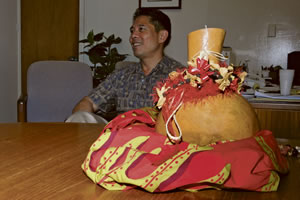
Native Hawaiian Healthcare
August 17, 2011
By Dr. Gerard Akaka


Dr. Gerard Akaka
Vice president of medical affairs at The Queen’s Medical Center
What is your role at The Queen’s Medical Center?
I am the vice president of medical affairs, and chief medical officer and the medical director for the Native Hawaiian Health Program. As the vice president of medical affairs, I am a member of an executive team that strives to fulfill the intent of our founders, Queen Emma and King Kamehameha IV, to provide high quality and safe care to Native Hawaiians and all of the people of Hawaii. I am the administration’s main liaison with the medical staff, and I work closely with department and division chiefs to make sure that we have competent and compassionate physicians on staff.
{embed=“elements/box_ad”}
Where did you receive your schooling and training?
I am a proud product of the Kamehameha Schools, University of Hawaii at Manoa and the John A. Burns School of Medicine. I was fortunate to have gone through the Imi Ho’ola program which made it possible for me to enter medical school.

|
What is the Imi Ho’ola program?
At the time, Imi Ho’ola was a program for minority students who had the potential to go to medical school. Currently, it is a program within the medical school’s Department of Native Hawaiian Health, which selects promising college graduates from under-served or disadvantaged communities, offering them a year of intensive preparation for medical school. Upon completion of training, they earn a place in the next class of M.D. students.
Are Native Hawaiian health statistics improving?
Sadly, Hawaiians do worse in cancer, heart attack, stroke, obesity and diabetes than other ethnicities. Dr. Kazuma Nakagawa, a Queen’s physician, noted that Hawaiians get strokes 10 years younger than other nationalities. His research in this matter will hopefully result in improvement of this worrisome statistic.

|
Why such a bleak record, and what can we do to improve it?
Hawaiians need to “malama,” or take better care of, our health. Unfortunately, many don’t have the means to buy and prepare healthy food that would improve our health. We must try to cut down on our sweetened drinks and food portion sizes. Foods that are tasty and convenient like Spam and ice cream should be taken in moderation or eliminated.
A study has shown that education can impact health. People use their education to get better jobs which provides income for healthier foods, activities and education.
{embed=“elements/google_ad336x280”}
Any concluding thoughts about Native Hawaiian health?
Hawaiians who have a healthy lifestyle and medical follow-up can improve their longevity and quality of life. I also believe that there’s a place for traditional Hawaiian healing. There are many physical, mental and spiritual issues that Western medicine cannot treat.